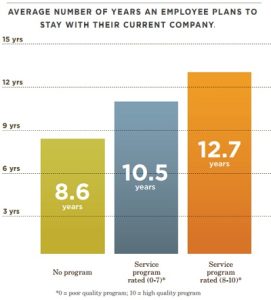Every few months, chatter in the media – and from some competitors – attempts to make the point that in the millennial-driven gig economy, service award programs must surely be irrelevant to employees and ineffective tools for organizations.
I hope to dispute those claims once and for all.
Service Awards Increase Retention
Through research we’ve done at the O.C. Tanner Institute, we’ve discovered that years of service award programs fulfill a critical role in company culture and employee engagement, resulting in employees staying longer at companies that offer service award programs.
Respondents whose current job had a career milestone program projected staying 2.9 years longer than participants in companies without a milestone program. The magnitude of this data provides clear evidence that companies that incorporate a career milestone program are inspiring greater employee loyalty.
Two significant factors of employee engagement (“the degree employees feel their company cares about its employees” and “the degree employees feel they fit in and belong”) were directly impacted by observing or receiving years of service recognition, and significantly increased employees’ likelihood to stay with their company. 19% more employees strongly felt their current company cared about employees and 18% more employees strongly felt they fit in and belonged at their current company if the company offered service awards.
Extensive cross-segment analysis of varying demographic groups and cultures uncovered the impact of career milestone programs reached across generations and impacted older and younger employees alike. Employees from all age groups stayed longer at previous companies, and estimated staying longer at their current company, when those companies had a length of service program.
Results Hold True Globally
We also analyzed the cultural differences among European, Asian, and Latin American participants, discovering the correlation between years of service award programs and employee tenure exists in all three regions. Regardless of age or culture, length of service award programs increase the likelihood of employee loyalty by improving employee engagement through an atmosphere of belonging and appreciation.
On average, U.S. employees stayed at previous companies two years longer if the company had a milestone program (6.7 years vs. 4.7). Considering that the median employee tenure reported by the Bureau of Labor Statistics is 5.1 years for workers over 25, it’s clear that companies with milestone programs are achieving above average employee tenure, while those without are falling behind.
 Similarly, employees currently in companies with milestone programs estimate they will stay an average of 2.9 years longer than employees in companies without (11.5 vs. 8.6 years.) More compelling still is that the higher the quality of program, the longer employees estimate they will stay.
Similarly, employees currently in companies with milestone programs estimate they will stay an average of 2.9 years longer than employees in companies without (11.5 vs. 8.6 years.) More compelling still is that the higher the quality of program, the longer employees estimate they will stay.
For example, employees who rate their company’s milestone program as an 8-10 on a 0-10 scale estimate they’ll stay at their company 2.2 years longer than employees who rated their company’s program as a 0-7, and 4.1 years longer than employees without a milestone program. These statistically significant differences provide persuasive evidence that milestone programs are strongly correlated with increased employee tenure.
Career Milestone Programs Demonstrate Care
Years of service award programs improve the degree to which employees experience feelings the company cares about them (vertical engagement with managers) and that they fit in and belong in the organization (horizontal engagement with peers).
In short, for the price of implementing an effective, years of service award program, almost 20% more employees will feel strongly that their company cares about them and that they personally fit in and belong to the organization. And on average, employees who feel positively about these key engagement elements stay four years longer at their companies than employees who are not similarly engaged. This effect of service award programs is observed at about this same magnitude in employees both young and old, and in each major region of the world.
Given the magnitude of the positive impact of a service award program, they’re likely here to stay, and are far from irrelevant or outdated.
A version of this post appeared on OCTanner.com.
